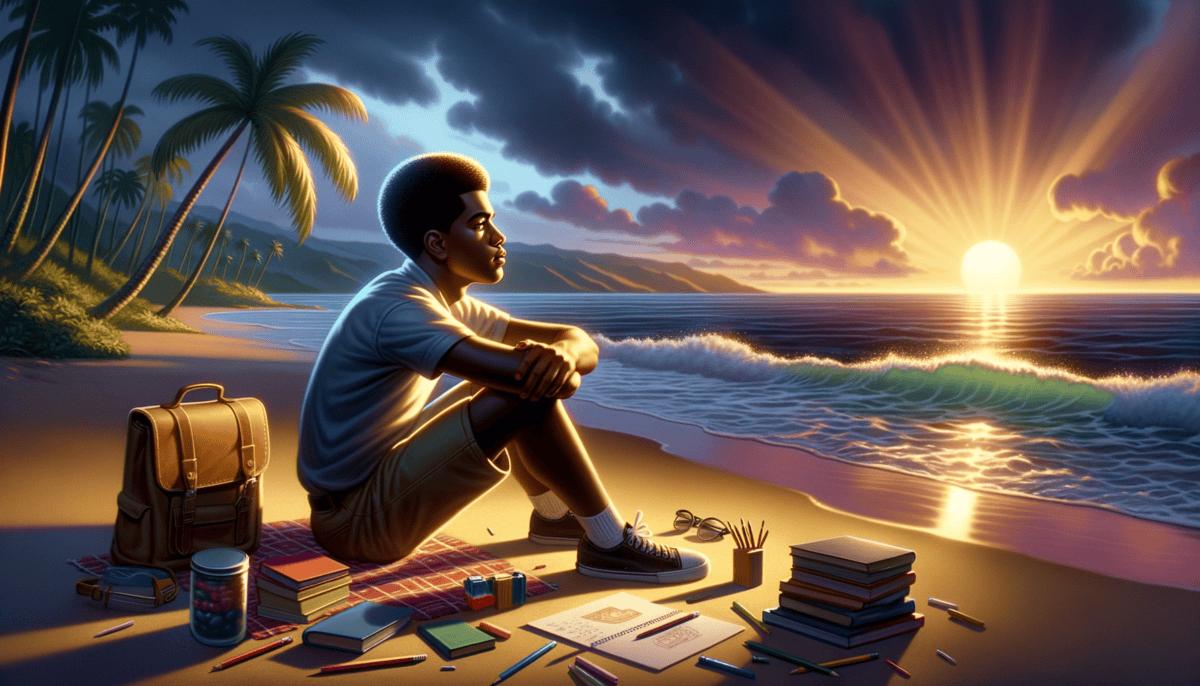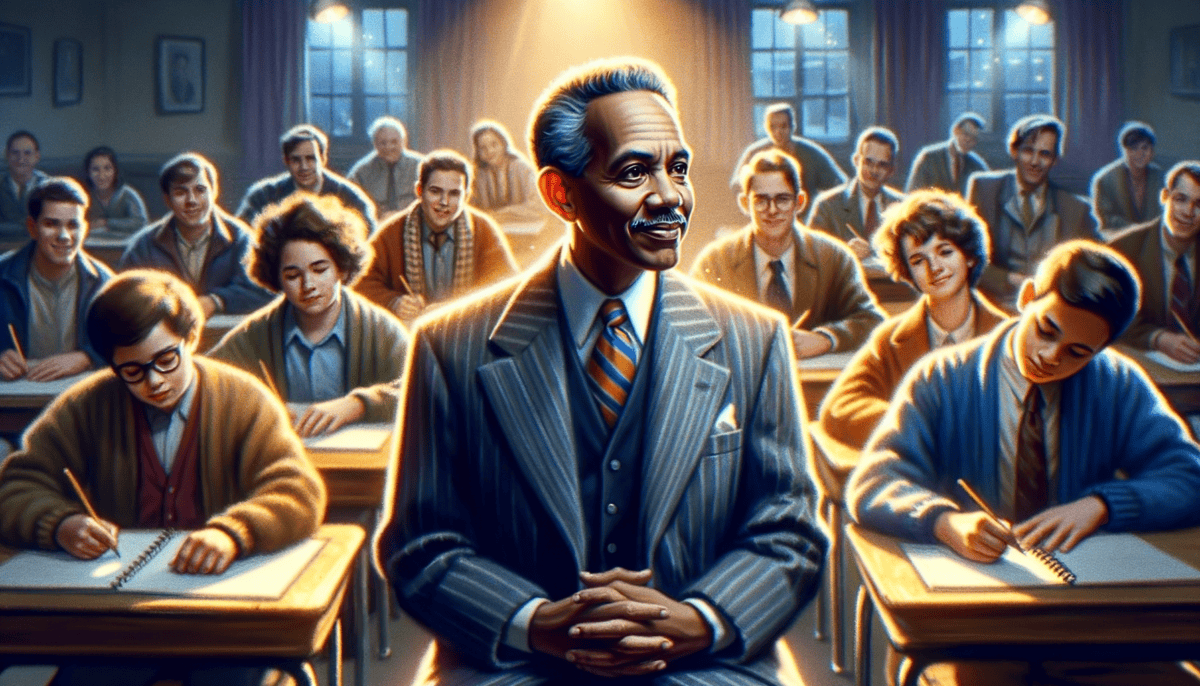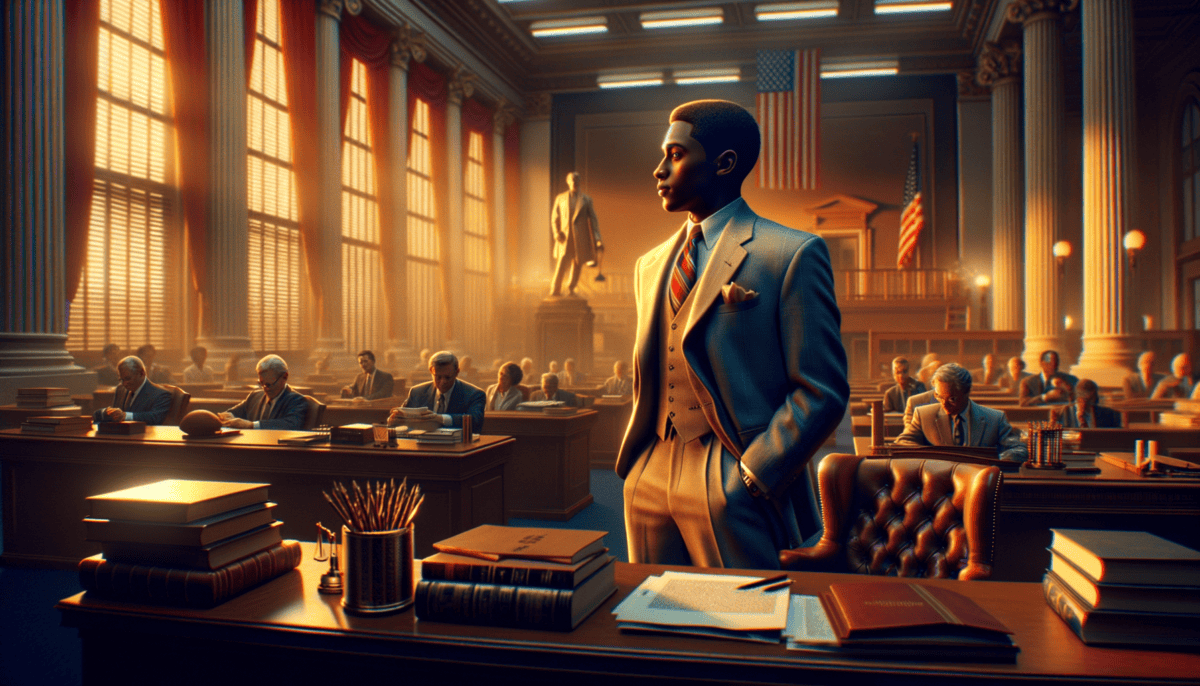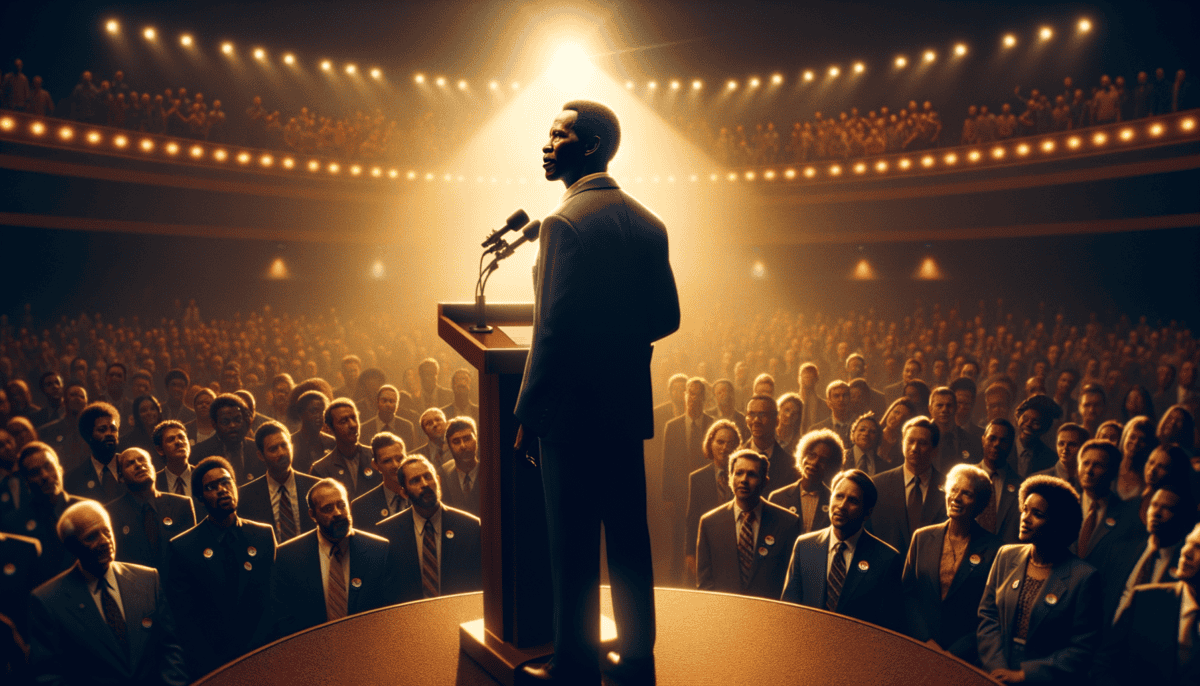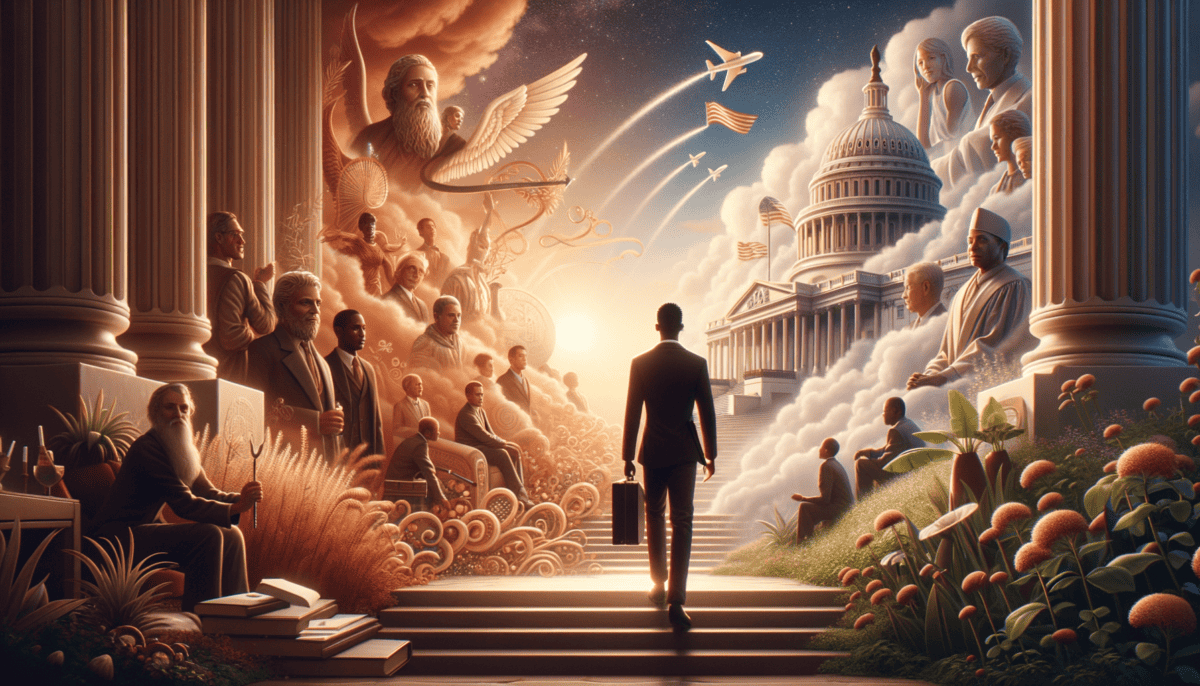Roots of Hope
On a sunny day in Honolulu, Hawaii, a special baby boy was born. His name was Barack Obama. The year was 1961, and his family was different from many others.
Little Barack had a mom named Ann who came from Kansas. She was very smart and loved to learn about different places and people. His dad, also named Barack, came all the way from Kenya in Africa!
"You're going to do great things one day," Ann would tell baby Barack as she rocked him in their small apartment. The warm Hawaiian breeze would float through their windows, carrying the sweet smell of plumeria flowers.
Barack's grandparents, who he called "Tutu" and "Gramps," lived nearby. They helped take care of him and filled his days with love and fun.
“In Hawaii, we’re all one big family,” Tutu would say as they walked along the beach. “It doesn’t matter what you look like or where your family comes from.”
When Barack was six years old, his mother married a man from Indonesia named Lolo. They moved to Jakarta, a big city with busy streets and colorful markets. ️
Life in Indonesia was very different from Hawaii. Barack learned to:
• Speak a new language
• Eat new foods
• Make friends with children who looked different from him
• Understand new customs and traditions
His mother would wake him up early every morning to study English. "Education is your ticket to making the world better," she would say with a smile.
Sometimes, Barack would sit and watch the street vendors selling their treats, the mosque calling people to prayer, and children playing in the rain. He learned that people everywhere are more alike than different.
After a few years in Indonesia, Barack returned to Hawaii to live with his grandparents. The islands welcomed him back with their warm aloha spirit.
Tutu and Gramps made sure he never forgot the important lessons he learned: to be kind to everyone, to work hard, and to dream big. They told him stories about America's history and taught him to believe in himself.
Back in his Hawaiian classroom, Barack shared stories about his life in Indonesia with his classmates. His teacher, Mrs. Anderson, encouraged him to write about his experiences.
"You have seen so much of the world already, Barry," she said. "That makes you special. You understand things that many people never get to learn."
Young Barack would often stand at the beach, watching the waves crash against the shore. He thought about his family – spread across different continents, speaking different languages, but all connected by love.
His early years taught him that the world is full of wonderful differences, and that these differences make life rich and beautiful. This understanding would shape his future in ways that nobody could have imagined.
At night, Barack would look up at the stars from his grandparents' apartment. The same stars shone over Kenya where his father lived, over Indonesia where he had made friends, and over Kansas where his mother's family came from.
These early experiences planted seeds in young Barack's heart – seeds of hope, understanding, and the belief that all people deserve respect and kindness. These seeds would grow stronger as he got older, leading him toward an amazing future.
As the Hawaiian sun set each day, painting the sky in beautiful colors, Barack didn't know yet that his unique childhood was preparing him for an extraordinary journey. He was just a boy who loved shave ice, playing basketball, and listening to his grandfather's stories. But the lessons he learned about love, diversity, and determination would stay with him forever.
Finding His Way
The warm Hawaiian sun shone down on Punahou School, where teenage Barack “Barry” Obama walked through the hallways. It was the 1970s, and Barry was trying to figure out who he really was.
“Sometimes I feel different from everyone else,” Barry told his friend Keith one day during basketball practice.
“That’s what makes you special, man,” Keith replied, passing him the ball. “You’ve got stories nobody else has.”
Barry loved playing basketball. On the court, nothing mattered except how well you played the game. He practiced hard and became one of the team’s best players.
• Playing basketball with friends
• Reading books about heroes
• Writing stories in English class
• Learning about history
• Making people laugh
But off the court, things weren’t always easy. Barry looked in the mirror and saw someone who didn’t look like most of his classmates or teachers. His skin was darker, and his hair was different.
“Tutu,” he asked his grandmother one evening, “why do people care so much about how others look?”
She hugged him and said, “People who judge others by their looks are missing out on knowing wonderful human beings.”
Barry started reading lots of books about African American leaders. He learned about Martin Luther King Jr., Malcolm X, and other brave people who fought for equality.
His teachers noticed how smart he was. Ms. Thompson, his English teacher, always praised his writing. “You have a gift for words, Barry,” she would say. “Use it to tell your story.”
After school, Barry would often sit on the beach, watching the surfers ride the waves. He thought about his father in Kenya, whom he barely knew. He thought about his mother, who was working in Indonesia. He thought about who he wanted to become.
His grandfather took him to college fairs and told him, “Education can open any door, Barry. Dream big!” Barry started thinking about going to college on the mainland.
In his senior year, Barry worked really hard. He studied late into the night, played basketball, and helped younger students with their homework. His good grades and kind heart made his family proud.
“You’re going to do amazing things,” his mother wrote in a letter from Indonesia. “Just keep being yourself.”
When graduation day came, Barry felt excited and a little scared. He was going to leave Hawaii to study at Occidental College in California.
“Remember who you are,” Tutu said as she helped him pack. “You’re a boy from Hawaii who knows how to bring people together.”
As his plane took off from Honolulu, Barry looked down at the islands where he grew up. The memories of playing basketball, studying with friends, and learning about his identity would stay with him forever. He was ready for his next big adventure.
When Barry landed in California, he wasn’t just Barry from Hawaii anymore. He was Barack Obama, a young man with big dreams and the courage to chase them. His journey of self-discovery was just beginning, and the mainland United States was waiting to welcome him.
Dreams in Chicago
The year was 1985, and Barack Obama stepped off the train in Chicago. The wind blew cold, very different from Hawaii’s warm breeze. He had come to help people in neighborhoods that needed hope.
“Welcome to the South Side,” said Jerry Kellman, shaking Barack’s hand. “Ready to make a difference?”
“I’m ready to learn and help however I can,” Barack replied, looking at the tall buildings around him.
Barack worked as a community organizer. That meant he helped people work together to make their neighborhoods better. He walked through streets where houses needed fixing and schools needed supplies. ️
• Meeting with families
• Visiting churches
• Helping neighbors solve problems
• Planning community meetings
• Learning from local leaders
One day, Barack met Mrs. Johnson, whose apartment building had no heat. “We need someone to listen to us,” she said, wrapping her sweater tight.
“Let’s gather everyone,” Barack suggested. “Together, we can make them hear us.”
He learned that real change happens when people work together. Sometimes it was hard work. Some days, nobody would come to his meetings. But Barack didn’t give up.
Then something special happened. Barack met a smart lawyer named Michelle Robinson. She worked at a big law firm and was supposed to be his mentor.
“Want to get some ice cream?” he asked after their first work meeting.
Michelle smiled. “I don’t date people I work with.”
“This isn’t a date,” Barack said with a grin. “It’s just ice cream!”
Working in Chicago taught Barack important lessons. He learned that everyone’s voice matters. He saw how small changes could make big differences in people’s lives.
“You remind me of a young pastor,” Reverend Wright told him one Sunday. “You bring people together and give them hope.”
After three years of community work, Barack knew he wanted to do more. He decided to go to law school to learn how to make bigger changes. But Chicago had changed him forever.
Michelle hugged him goodbye when he left for Harvard Law School. “Don’t forget us here in Chicago,” she said.
Barack looked at the city he’d grown to love. “I’ll be back,” he promised. “This is home now.”
The lessons Barack learned in Chicago stayed in his heart: listen to people, work together, and never give up. These ideas would help him become a leader who could bring hope to not just one city, but an entire country.
Dreams of Justice
The halls of Harvard Law School echoed with busy footsteps. Barack Obama walked through them with purpose, carrying heavy law books under his arm. It was 1988, and he was chasing bigger dreams.
“These books are like roadmaps to justice,” Barack told his friend David. “Every page helps us understand how to make things fair for everyone.” ⚖️
“What made you want to lead the Law Review?” a reporter asked.
“I want to show that everyone deserves a chance to lead,” Barack answered with a smile. “Your skin color shouldn’t stop you from reaching your dreams.”
Letters from Michelle arrived often, filled with news from Chicago. He missed her and the community work he’d left behind.
“Dear Barack,” one letter read. “The neighbors still ask about you. Come back soon!”
After finishing law school, Barack kept his promise. He returned to Chicago and started teaching about the Constitution at a university. He also joined a small law firm that helped people fight for their rights. ️
In 1996, Barack took a big step. He ran for the Illinois State Senate. This meant he could help make laws to improve people’s lives. ️
“Why do you want to be a senator?” asked a voter named Mrs. Thompson.
“Because good laws can help families get better schools, jobs, and healthcare,” Barack explained. “I want to be your voice in Springfield.”
• Help poor families get health insurance
• Make police treat everyone fairly
• Help more kids go to college
• Give workers better rights
Sometimes, other senators didn’t agree with Barack’s ideas. But he learned to listen and work with people who thought differently.
“We can disagree without being mean to each other,” he often said. “That’s how democracy works best.”
Michelle, now his wife, watched proudly as Barack grew as a leader. “You’re still the same person who wanted to help neighborhoods in Chicago,” she said. “Just with a bigger neighborhood now.”
Barack smiled at his growing family – Michelle and their daughters, Malia and Sasha. They gave him strength to keep working for a better future.
The years in the State Senate taught Barack important lessons about making laws and bringing people together. These lessons would help him dream even bigger dreams – dreams that would take him all the way to Washington, D.C.
A Voice for Change
The summer sun sparkled over Boston in 2004. Barack Obama stood backstage at the Democratic National Convention, his heart beating fast.
“Are you nervous?” Michelle squeezed his hand.
“A little,” Barack smiled. “But I’m ready to share our American story.”
When Barack walked onto the stage, the bright lights shined on him. He took a deep breath and began to speak:
“My father was from Kenya, my mother from Kansas. They gave me an African name, Barack, which means ‘blessed.’ They believed that in a tolerant America, their mixed-race son could achieve anything.”
The crowd grew quiet, listening to every word. Barack talked about hope and bringing people together. He spoke about how America could be better if everyone worked together.
When he finished speaking, the whole room erupted in cheers. People stood up and clapped. Some even had tears in their eyes.
The next morning, Barack’s phone wouldn’t stop ringing. His speech had touched millions of hearts across America.
• Hope is stronger than fear
• All Americans should work together
• Everyone deserves a fair chance
• Change is possible when we unite
Later that year, Barack ran for the United States Senate. He traveled all around Illinois, talking to people about their hopes and worries.
“What matters most to you?” he asked a group of factory workers.
“We want good jobs and better schools for our kids,” they told him.
Barack won the Senate race! Now he could help people from his whole state. But something even bigger was starting to grow in his heart – a dream to help all of America.
People everywhere started asking Barack: “Will you run for president?”
He talked about it with Michelle and their daughters. “It will be hard,” he told them. “But we could help make life better for families across America.”
Malia and Sasha hugged their dad. “We believe in you, Daddy!” they said.
Michelle looked at her husband with pride. “If you believe you can make a difference, then I’m with you.”
As Barack thought about running for president, he remembered all the people he’d met – the children dreaming big dreams, the parents working hard for their families, the seniors hoping for a secure future. Their stories gave him courage to take the next big step.
Dreams Take Flight
The cold Chicago wind swept across Grant Park on November 4, 2008. Thousands of people gathered, their eyes glued to giant screens showing election results. Barack Obama stood with Michelle and their daughters, watching history unfold.
“Daddy, look!” Malia pointed excitedly. The numbers on the screen were changing.
That night, Barack walked onto a huge stage with his family. The crowd cheered so loud it seemed like the whole world was celebrating.
“If there is anyone out there who still doubts that America is a place where all things are possible,” Barack’s voice rang out, “tonight is your answer.”
As President, Barack worked hard to help American families. He made sure more people could go to the doctor when they were sick. He helped save jobs during a tough time when many people were worried about work.
“What’s the most important part of being President?” a young student asked during a school visit.
“Taking care of people,” Barack answered with a warm smile. “Just like my mother taught me.”
Barack traveled around the world, meeting kings and queens, presidents and prime ministers. But he never forgot the regular people who needed help the most.
• Helped more people get healthcare
• Made schools better
• Protected the environment
• Brought soldiers home from war
Every night, Barack would read letters from American people. Sometimes they wrote about their problems, sometimes about their dreams. He kept their stories in his heart.
Eight years passed quickly. On his last day as President, Barack visited a school in Washington, D.C.
“What will you do now?” asked a little girl.
“I’ll keep working to help people,” Barack said. “And I’ll help young leaders like you make the world better.”
Today, Barack Obama continues to inspire people around the globe. He shows that with hard work, determination, and hope, dreams really can come true. His story teaches us that no matter where we come from or what we look like, we all have the power to make a difference.
From a little boy in Hawaii to the President of the United States, Barack Obama’s journey reminds us that anything is possible. His message of hope, change, and unity continues to light the way forward for new generations of dreamers.


